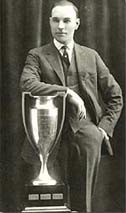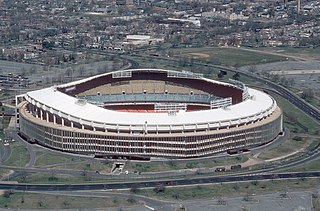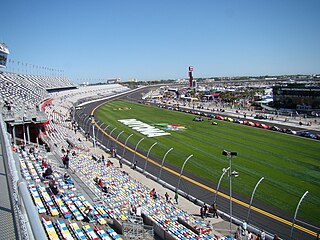
In sports, a most valuable player (MVP) award is an honor typically bestowed upon an individual as the most performing player in an entire league, for a particular competition, or on a specific team. Initially used in professional sports, the term is now also commonly used in amateur sports, as well as in other completely unrelated fields such as business and music. In many sports, MVP awards are presented for a specific match—in other words, a player of the match award.

The MLS Cup is the annual championship game of Major League Soccer (MLS) and the culmination of the MLS Cup Playoffs. The game is held in early November and pits the winner of the Eastern Conference Final against the winner of the Western Conference Final. The MLS Cup winner is awarded the title of league champion.

The Curse of Billy Penn (1987–2008) was a curse used to explain the failure of major professional sports teams based in Philadelphia to win championships since the March 1987 construction of the One Liberty Place skyscraper, which exceeded the height of William Penn's statue atop Philadelphia City Hall.
In sports, a dynasty is a team or individual that dominates their sport or league for an extended length of time. Some leagues maintain official lists of dynasties, often as part of a hall of fame, but in many cases, whether a team or individual has achieved a dynasty is subjective. This can result in frequent topic of debate among sports fans due to lack of consensus and agreement in the many different variables and criteria that fans may use to define a sports dynasty. Merriam-Webster describes a dynasty as a "sports franchise which has a prolonged run of successful seasons". Within the same sport, or even the same league, dynasties may be concurrent with each other.

The 1996 NBA Finals was the championship series of the National Basketball Association (NBA)'s 1995–96 season, and the culmination of the season's playoffs. The Western Conference champion Seattle SuperSonics (64–18) played the Eastern Conference champion Chicago Bulls (72–10), with the Bulls holding home court advantage. The teams' 136 combined regular season wins shattered the previous record of 125, set in 1985 between the Los Angeles Lakers who won 62 games and the Boston Celtics who won 63 games in the past regular season. The series, the 50th NBA finals in league history, was played under a best-of-seven format. This was the first championship in the Chicago Bulls' second three-peat.
In sports, the terms Cinderella, "Cinderella story", and Cinderella team are used to refer to situations in which competitors achieve far greater success than would reasonably have been expected. Cinderella stories tend to gain much media and fan attention as they move closer to the championship game at the end of the tournament. The term comes from Cinderella, a well-known European folk tale embodying a myth-element of unjust oppression/triumphant reward. The title character is a woman living in unfortunate circumstances that are suddenly changed to remarkable fortune. In a sporting context the term has been used at least since 1939, but came into widespread usage in 1950, when the Disney movie came out that year, and in reference to City College of New York, the unexpected winners of the NCAA Men's Basketball championship also that year. The term was used by Bill Murray in the 1980 hit movie Caddyshack where he pretends as the announcer to his own golf fantasy: "Cinderella story. Outta nowhere. A former greenskeeper, now, about to become the Masters champion."
A championship ring is a ring presented to members of winning teams in North American professional sports leagues, and college tournaments.
The 1979 NBA World Championship Series was the championship series played at the conclusion of the National Basketball Association (NBA)'s 1978–79 season. The Western Conference champion Seattle SuperSonics played the Eastern Conference champion Washington Bullets, with the Bullets holding home-court advantage, due to a better regular season record. The SuperSonics defeated the Bullets 4 games to 1. The series was a rematch of the 1978 NBA Finals, which the Washington Bullets had won 4–3.
Seattle's sports history began at the start of the 20th century with the Pacific Coast Hockey Association (PCHA)'s Seattle Metropolitans, which in 1917 became the first American hockey team to win the Stanley Cup. Seattle's sports history continues today with the city's eight major professional teams: the National Football League (NFL)'s Seattle Seahawks, Major League Baseball (MLB)'s Seattle Mariners, Major League Soccer (MLS)'s Seattle Sounders FC, the Women's National Basketball Association (WNBA)'s Seattle Storm, the National Women's Soccer League (NWSL)'s OL Reign, Major League Rugby (MLR)'s Seattle Seawolves, the XFL's Seattle Dragons, and the future National Hockey League (NHL)'s Seattle Kraken. Seattle also boasts a strong history in collegiate sports, with two National Collegiate Athletic Association (NCAA) Division I schools: the University of Washington and Seattle University, and one NCAA Division II school, Seattle Pacific University.

Sports in Chicago include many professional sports teams. Chicago is one of ten U.S. cities to have teams from the five major American professional team sports. Chicago has been named as the "Best Sports City" by Sporting News three times in 1993, 2006 and 2010.
A sports-related curse is a superstitious belief in the effective action of some power or evil, that is used to explain the failures or misfortunes of specific sports teams, players, or even cities. Teams, players, and cities often cite a "curse" for many negative things, such as their inability to win a sports championship, or unexpected injuries.

Sports in the Washington, D.C. area include major league sports teams, popular college sports teams, and a variety of other team and individual sports. The Washington metropolitan area is also home to several major sports venues including Capital One Arena, RFK Stadium, FedExField, Audi Field, and Nationals Park.
The Cleveland sports curse was a sports superstition involving the city of Cleveland, Ohio, and its major league professional sports teams, centered on the failure to win a championship in any major league sport for 52 years, from 1964 to 2016. Three major league teams based in Cleveland contributed to belief in the curse: the Browns of the National Football League (NFL); the Cavaliers of the National Basketball Association (NBA); and the Indians of Major League Baseball (MLB).

The Los Angeles metropolitan area is home to several professional and collegiate sports teams. The Greater Los Angeles Area has eleven major league professional teams: the Anaheim Ducks, the Los Angeles Angels, the Los Angeles Chargers, the Los Angeles Clippers, the Los Angeles Dodgers, Los Angeles FC, LA Galaxy, the Los Angeles Kings, the Los Angeles Lakers, Los Angeles Sparks, and the Los Angeles Rams. A 12th major league team, an as-yet-unnamed side in the National Women's Soccer League, is set to start play in 2022. USC Trojans football, UCLA Bruins men's basketball, USC Trojans baseball, USC Trojans track & field, and Cal State Fullerton Titans baseball are all historically premier organizations in college sports. Other major sports teams include UCLA Bruins Football, Pepperdine Waves baseball, and formerly the Los Angeles Raiders and Los Angeles Aztecs. Between them, these Los Angeles area sports teams have won a combined 105 championship titles. Los Angeles area colleges have produced upwards of 200 national championship teams, primarily from USC Trojans and UCLA Bruins of the Pac-12 Conference.

The San Francisco Bay Area, which includes the major cities of San Francisco, Oakland and San Jose, hosts six major league sports franchises, as well as several other professional and college sports teams, and hosts other sports events.
Texas is home of several national sports league franchises among other professional sports, being the second most populated U.S. state. Since the state is located in the South Central United States, most teams are part of the Central / South or West league divisions, with the notable exception of the NFL Dallas Cowboys, which is an NFC East franchise.

The U.S. state of Florida has three National Football League teams, two Major League Baseball teams, two National Basketball Association teams, two National Hockey League teams, and two Major League Soccer teams.








